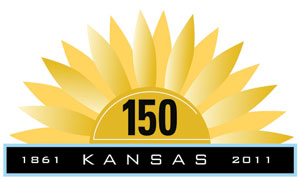 A few weeks ago the Facebook community was all abuzz that a big official state event celebrating Kansas’ 150th birthday was taking place in Wichita on Oct. 8, which is Yom Kippur. Kansas Gov. Sam Brownback is expected to attend the Kansas 150 Festival as are many other elected officials from across the state.
A few weeks ago the Facebook community was all abuzz that a big official state event celebrating Kansas’ 150th birthday was taking place in Wichita on Oct. 8, which is Yom Kippur. Kansas Gov. Sam Brownback is expected to attend the Kansas 150 Festival as are many other elected officials from across the state.
The event was planned to coincide with the annual Kansas League of Municipalities meeting, which always takes place the second weekend in October. That weekend this year is Oct. 8-10. Jewish officials in Wichita believe the event was scheduled because no one on the planning committee really looked at a calendar or understood the significance of the date.
After meeting with Wichita Mayor Carl Brewer last week, officials of the Mid-Kansas Jewish Federation in Wichita believe that scheduling the event that day was simply a coincidence and not a slight at the Jewish community.
The event
The Kansas 150 Festival is not a state-sponsored event. It is sponsored by the Kansas Association of Counties and the League of Kansas Municipalities. According to the website ks150.com, Wichita Mayor Carl Brewer, who is also president of the League of Kansas Municipalities, is serving as chair of the event. He is being assisted by Gov. Brownback, Overland Park Mayor Carl Gerlach, immediate past president of the League, and Dodge City Councilman Jim Sherer, the League’s president-elect, along with other business and civic leaders from across Kansas. The day’s event includes a parade followed by a fair with vendors and a concert.
The Jewish population in Wichita is estimated to be between 800 and 1,000 people. The city’s population is about 400,000. Last week four people from the Mid-Kansas Jewish Federation — Sandy Diel, Federation director; Rabbi Michael Davis of Congregation Emanuel; Rabbi Nissim Wearnick of Ahavath Achim Hebrew Congregation; and Paul Wolff, president of the Mid-Kansas Federation — met with Wichita’s mayor to discuss the situation. Diel said they learned that the date for the festival was chosen to coincide with the meeting.
“They wanted to have an event for all of the city and county officials and their families that would be in Wichita for that meeting. They thought it seemed like a good idea to celebrate Kansas’ 150th birthday,” Diel continued. “They didn’t just pick the date out of thin air.”
Diel pointed out that other events have coincided with the High Holidays in Wichita. For instance the annual Susan G. Komen race is in Wichita the last weekend in September. In Kansas City, the Plaza Art Fair often coincides with the High Holidays as well.
Diel said she learned the governor always speaks at the League of Kansas Municipalities meeting.
“That’s how he got involved with this program, without realizing it is Yom Kippur,” she said.
A teachable moment
Besides learning why the date had been chosen, Diel said the group also hoped to educate the mayor about the importance of the High Holy Day.
“Nobody planning this event was familiar enough with the Jewish calendar to know it was a holy day. So we talked to him about why it was a holy day and we gave him a calendar for the future of Jewish holidays provided by the JCRB in Kansas City. We hope in the future when planning events he will be more aware of these days,” Diel said.
Diel said they told the mayor that Jewish people have a strong history in the state of championing civil rights and endorsing freedom.
“We are disappointed that we will not get to share in the celebration,” Diel said, also informing the mayor that the first congregation in Kansas was established in Leavenworth two years before the territory even became a state.
“Jews have always been a part of Kansas history. The fourth mayor of Wichita was Jewish,” she explained.
Extending the festival?
Diel said the date for the Kansas 150 Festival cannot be changed. The festival will still be going on after sundown, making it possible for members of the Jewish community to attend a small portion of it if they choose. There is also the possibility of adding an event on Sunday.
“That option is being explored now, but there is no commitment that will happen for sure,” Diel said.
Diel said she and her colleagues were happy with the result of their meeting with the mayor.
“We all walked away feeling that we understood each other better. We were educated on the event and believe it wasn’t a slight to the Jewish community. It was an oversight that just required more education. If they attempt to extend some things and that really comes to fruition, that would be a really good show of good faith and we believe that the mayor is going to try to do that,” she said.


